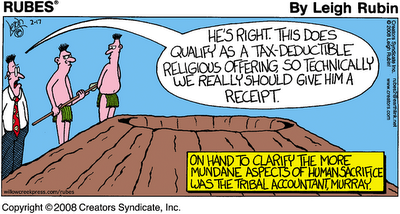Haiti Relief Donations Qualify for Immediate Tax Relief – IRS clarifies this recently enacted law.
People who give to charities providing earthquake relief in Haiti can claim these donations on the tax return they are completing this season, according to the Internal Revenue Service.
Taxpayers who itemize deductions on their 2009 return qualify for this special tax relief provision, enacted Jan. 22. Only cash contributions made to these charities after Jan. 11, 2010, and before March 1, 2010, are eligible. This includes contributions made by text message, check, credit card or debit card.
They also remind people:
Taxpayers have the option of deducting these contributions on either their 2009 or 2010 returns, but not both.
Of course, a year from now, there will be plenty of people who will very innocently accidentally deduct these same payments on their 2010 1040 as they total up payments made during the 2010 calendar year.
Labels: Charity
Non-Cash Donations Worksheet
I was browsing the new additions to the always useful TaxTools program and noticed the worksheet they have for listing and valuing non-cash donations. It has suggested values for used items, making it easier to work with than having to refer to outside sources such as the Salvation Army's guide.
I made up a blank PDF version of this worksheet that you can download from my site.
Labels: Charity, Deductions, worksheets
Tips on Donating Your Car
Here is a short video with Tom Herman of the WSJ discussing the rules for claiming a deduction for a donated vehicle.
After all of these years reading Tom Herman's columns in the WSJ, this is the first time I have seen what he actually looks like.
Over the years, I have discussed this topic several times and the biggest misconception seems to be with the term Fair Market Value. Even Mr. Herman glosses over this point in this video.
Most people assume that the Kelley Blue Book value is gospel as establishing a vehicle's value. The truth is that the only true determination of an item's worth is what it will actually fetch on the open market, as per this definition from all over the web.
The price that an interested but not desperate buyer would be willing to pay and an interested but not desperate seller would be willing to accept on the open market assuming a reasonable period of time for an agreement to arise.
That is why the relatively recent IRS rule requiring people to use the charity's actual sales price of the vehicle for the charitable deduction makes a lot of sense. That isn't something you ever see me say very often; IRS doing something that makes sense.
I don't follow used car prices or track what Kelley Blue Book has been doing in response to the higher fuel prices. However, if they haven't dropped values of gas hogs to reflect their decreases in the real world, that is no excuse to consider the Blue Book prices as Fair Market Value.
Update:
A day after posting this, I sent the following to a client:
We received your 2007 personal tax organizer and other docs. I've
looked them over and the only item that is obviously incomplete has to do with the Jeep you donated to St. Vincent de Paul (SVP).
I see that you wrote $2,000 in the organizer as the value, but that won't be enough documentation. As the letter from SVP says, you need to have a 1098-C from them showing how much they actually sold the vehicle for if you are going to claim a value of more than $500. I didn't see a 1098-C among the documents that you sent in. Please contact SVP to obtain a new copy of that form or else we will have to stick with a deduction of just $500.
To help you understand more about this issue, I have attached a copy of the page from The TaxBook, my main tax reference book with the section on vehicle donations circled in red. Please look it over and see how your situation matches up with the examples shown.
Also, just by coincidence, I recently posted an entry on my blog, with a video from the WSJ, on exactly this subject.
Thanks for you help with this. Let me know if you would like to set up a phone appointment to discuss the details of this in more depth.
Kerry
The client wrote back:
I don't have any such documentation. In that case, I'll go ahead and claim $500.
Thanks,
Labels: Charity, Vehicles, video
Charitable Gifts – Still Deductible, But You Must Have Proof
Courtesy of the most recent email bulletin from ACAT.
If you are like most Americans, you make donations throughout the year. Your schools, religious groups, museums, Salvation Army, Cancer Fund and many more non-profit organizations benefit from your giving.
The U.S. Congress recognizes the benefits of your generosity and has steadfastly maintained deductions on your federal income tax for charitable giving. But this doesn’t mean that there aren’t regulations to be followed. And the rules have gotten stricter for reporting charitable gifts on your 2007 tax return.
Donations of Cash
The good news: You are still permitted to take substantial tax write-offs for charitable contributions – as high as 50 percent of your adjusted gross income.
The old news: Charitable contributions of $250 or more require a specific written acknowledgment from the charity.
The new (stricter) news: Any out-of-pocket cash donations you make without documentation cannot be deducted. No longer can you deduct cash dropped in the collection plate at church or synagogue.
The solution: Get a receipt for all donations.
All donations must be documented by a bank record (cancelled check or bank statement) or a written communication from the charity. The documentation must include the name of the charity, the date of the contribution, and the amount of the contribution.
For contributions of $250 or more, you can deduct the contribution only if you have an acknowledgment of your contribution from the charity. A bank record is not sufficient documentation for a donation of $250 or more.
Donations of Clothing and Household Goods
The good news: These donations are still deductible.
The hard to understand rules: Experts are still working on how to interpret the language which reads, “to be deductible, clothing and household items donated to charity after August 17, 2006, must be in good, used condition or better.” How does a taxpayer document the condition of used items? One option: Consider taking photos.
The documentation required for deduction of a non-cash donation varies with the amount of the deduction. If the deduction is less than $250, only a receipt from the charitable organization is required. For a deduction of $250 or more, a written acknowledgment from the charity is needed. If the deduction exceeds $500, detailed information on the items donated must be reported on your tax return. For donations exceeding $5,000 in value, a qualified appraisal is required to support the valuation. Recommendation: For all non-cash contributions, keep an itemized detailed inventory of what you donate including cost, date bought, condition and current value. Consider an appraisal or other means of documenting the value of expensive items that you plan to donate to charity.
In all cases: Consult your tax advisor for help with your specific situation.
This information is provided as a public service, and should not be construed as individual accounting or tax planning advice. For information on how these general principles apply to your situation, please consult an accounting or tax professional.
Labels: Charity

























